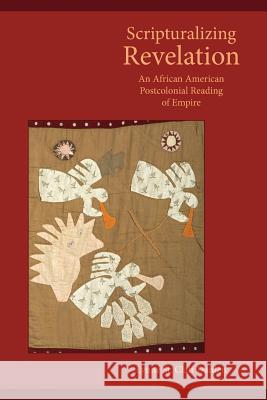Scripturalizing Revelation: An African American Postcolonial Reading of Empire » książka
Scripturalizing Revelation: An African American Postcolonial Reading of Empire
ISBN-13: 9781628370874 / Angielski / Miękka / 2015 / 210 str.
Scripturalizing Revelation: An African American Postcolonial Reading of Empire
ISBN-13: 9781628370874 / Angielski / Miękka / 2015 / 210 str.
(netto: 120,96 VAT: 5%)
Najniższa cena z 30 dni: 127,01
ok. 16-18 dni roboczych.
Darmowa dostawa!
Darden's reading of Revelation examines John the Seer's rhetorical strategy, in general, and imperial cult imagery in chapters 4 and 5, in particular, through the lens of an African American scripturalization supplemented by postcolonial theory. The scripturalization proposes that John the Seer's signifyin(g) on empire demonstrated that he was well aware of the oppressive nature of Roman imperialism on the lives of provincial Asian Christians. This is made evident by his fierce, non-accommodating stance towards participation in the imperial cult. Yet, ironically, John reinscribed imperial processes and practices. John's colonized construction as "almost the same but not quite like" has resulted in the production of a resistance strategy that is a "blurred copy" of the hegemonic tactics of the Roman Empire. Relating the potential for African American cooption by the U.S. Empire to the cooption by the Roman Empire both thematized and performed in Revelation, the book argues that African American biblical scholarship must now attend adequately to these complex cultural negotiations lest it find itself inadvertently feeding the imperial beast.
Dardens reading of Revelation examines John the Seers rhetorical strategy, in general, and imperial cult imagery in chapters 4 and 5, in particular, through the lens of an African American scripturalization supplemented by postcolonial theory. The scripturalization proposes that John the Seers signifyin(g) on empire demonstrated that he was well aware of the oppressive nature of Roman imperialism on the lives of provincial Asian Christians. This is made evident by his fierce, non-accommodating stance towards participation in the imperial cult. Yet, ironically, John reinscribed imperial processes and practices. Johns colonized construction as "almost the same but not quite like" has resulted in the production of a resistance strategy that is a "blurred copy" of the hegemonic tactics of the Roman Empire. Relating the potential for African American cooption by the U.S. Empire to the cooption by the Roman Empire both thematized and performed in Revelation, the book argues that African American biblical scholarship must now attend adequately to these complex cultural negotiations lest it find itself inadvertently feeding the imperial beast.











